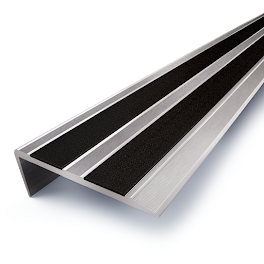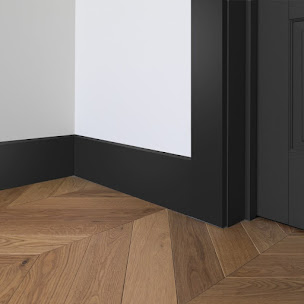A Brief Introduction to Aluminium Stair Nosing
Aluminum staircase nosing is a decorative and protective element that is used on the margins of staircases. Stair Nosing is intended to promote safety through offering a long-lasting, slip-resistant coating on the step edge as well as an aesthetically pleasing appearance. Stair nosing is widely used in both residential and business settings to reduce accidents, increase stair longevity, and conform with construction requirements and regulations.
Aluminum stair nosing, additionally referred to as stair edging and stair treads, is a sort of trim that is used to create a safe and long-lasting edge for stairs. It is often composed of aluminum, an extremely light and resistant to corrosion metal that is suitable for usage in a variety of indoor and outdoor environments. The major function of aluminum staircase nosing is to improve stair safety by lowering the danger of trips, falls, and slips. They are widely utilized in both commercial and residential structures, schools, hospitals, public locations, and industrial facilities.
When using vertical risers, the nose is the projection beyond the riser, or beyond the rear of the tread below when using angled stairs or no risers. Slip-resistant strips or nosings can be used. These stair parts are available in a range of materials, such as aluminum, vinyl, as well as wood.
Benefits of aluminium stair nosing:
Some key features and benefits of aluminium stair nosing are as follows:
Material:
Aluminum is a common material for stair nosing because it is lightweight, corrosion-resistant, and long-lasting. It can resist strong foot activity and is appropriate for use indoors as well as outdoors.
Wear and tear protection:
Stair nosing shields the steps' vulnerable edges against wear and tear resulting from continual foot activity. It can increase the lifespan of staircases and save on maintenance costs.
Anti-slip surface:
Aluminium Stair Nosing typically has a ribbed and textured surface that gives increased traction and grip, lowering the chance of stair accidents.
Building code compliance:
Many building rules and safety laws, particularly in public structures and commercial spaces, demand the setup of stair nosing. These codes help to protect the safety of the building's occupants and visitors.
Durability:
Aluminum is a strong material that can resist repeated use and being exposed to the environment, making it an effective option for stair border protection.
Easy installation:
Aluminum staircase nosing is relatively simple to install, requiring either adhesive or mechanical fixing. It comes in a variety of sizes and shapes to accommodate various kinds of stairs.
Low maintenance:
Aluminum stair nosing needs little upkeep once installed. Cleaning and inspecting it on a regular basis can help ensure its efficacy and longevity.
Consider the length and width of the steps, the traffic level of the region, the type of floor material, and any particular safety considerations when selecting aluminum stair nosing. Overall, aluminum stair noses play an important function in guaranteeing stairway safety, protection, as well as accessibility while also adding to the aesthetic and longevity of the s structure.
Conclusion:
In the end, aluminum stair noses are a practical and fashionable alternative for improving stair safety and longevity. Its combination of performance, durability, and beauty makes it an attractive option for a wide range of building and renovation projects.




Comments
Post a Comment